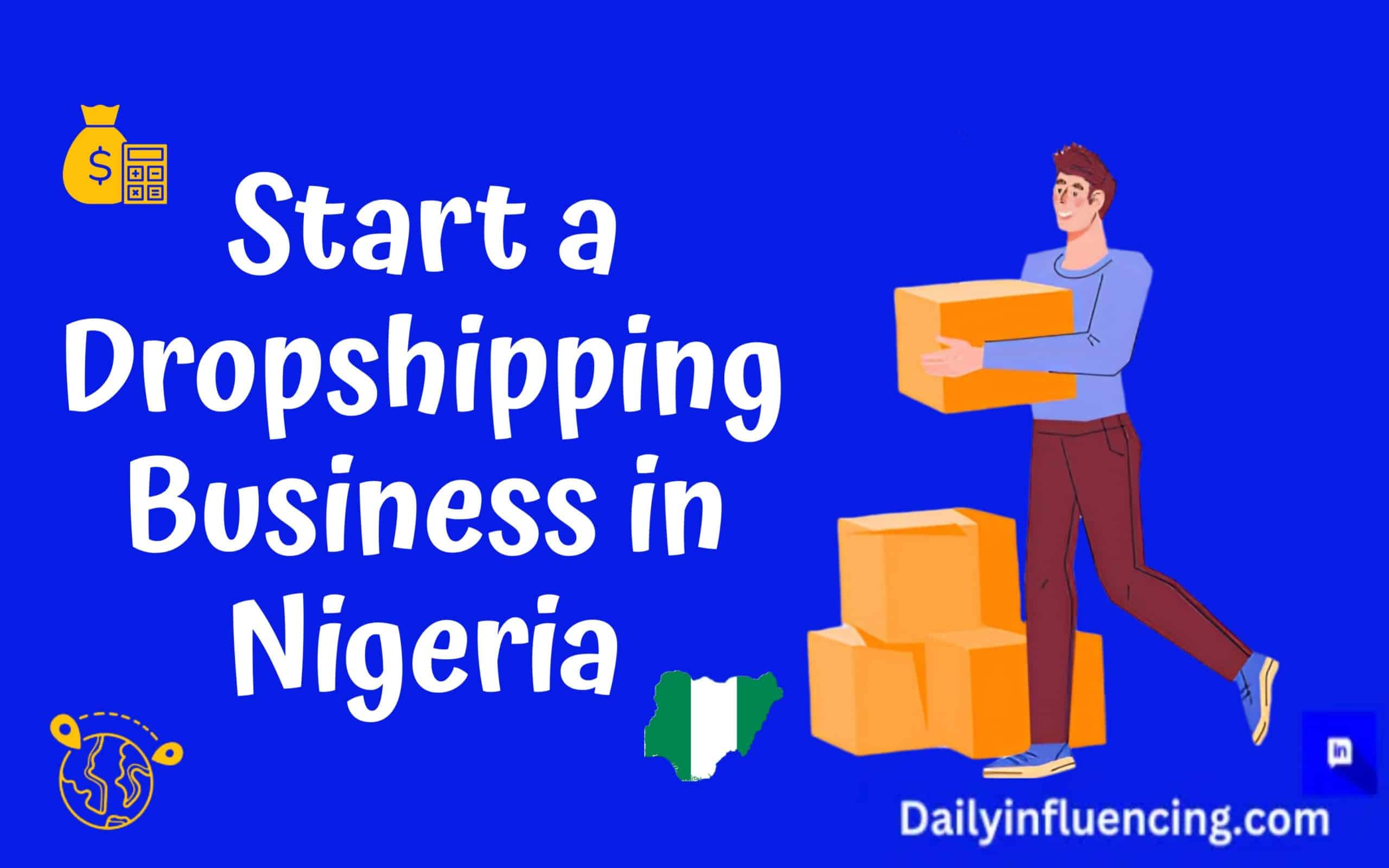
Starting a dropshipping business in Nigeria might seem intimidating at first. With the e-commerce boom hitting Africa, more Nigerians are looking for ways to tap into this goldmine without breaking the bank.
You’ve probably heard success stories of people making serious cash through dropshipping, but maybe you’re wondering, “Can I really do this from Nigeria?” The answer is a resounding yes! Nigeria’s growing internet penetration with over 104 million users as of 2024 and expanding makes it the perfect time to jump into the dropshipping scene.
In this guide, I’ll walk you through everything you need to know about starting a dropshipping business in Nigeria—from picking the right products to handling those pesky payment gateway issues.
What is Dropshipping and Why It Works in Nigeria
Dropshipping is a retail model where you don’t keep products in stock. Instead, when a customer buys something from your online store, you purchase it from a third party who ships it directly to the customer. You never handle the product yourself!
The Nigerian e-commerce market has exploded in recent years, growing to about $7.8 billion in 2025. With minimal upfront investment needed, dropshipping offers a fantastic opportunity for ambitious Nigerians looking to escape the 9-to-5 grind or supplement their income.
Selecting Profitable Niches for Dropshipping in Nigeria
Choosing the right niche for your dropshipping business in Nigeria determines whether you’ll feast or starve. Your e-commerce business in Nigeria needs focus – trying to sell everything to everyone is a quick path to failure. The Nigerian market has specific demands that generic international dropshipping guides don’t address.
Market Research Techniques for Nigerian Dropshipping
When researching niches for your dropshipping business in Nigeria, start with actual data. Filter Google Trends specifically for Nigeria – you’ll spot differences immediately between global trends and what Nigerian consumers actually search for.
It’s easy to double your e-commerce business in Nigeria after discovering Nigerians wanted smartphone accessories with Ankara prints – something completely missed when following international dropshipping advice.
Here’s what to do:
- Survey family and friends about products they can’t find locally
- Join Nigerian Facebook groups where people discuss shopping frustrations
- Check which imported products get marked up heavily in local markets
- Note which items your friends ask travelers to bring from abroad
Your Nigerian dropshipping success depends on solving real problems.
Hot Niches for Nigerian Dropshippers in 2025
The e-commerce business in Nigeria keeps changing. Currently, beauty products for African skin tones are booming – a niche underserved by physical Nigerian retailers.
- Your dropshipping business in Nigeria could target these promising niches:
- Home office equipment for remote workers (ergonomic chairs, desk setups)
- Fashion items with Afrocentric designs targeting middle-class Nigerians
- Affordable tech accessories with cultural elements
- Beauty products formulated specifically for Nigerian consumers
- Home décor items that blend modern design with traditional elements
The Nigerian e-commerce environment rewards specialists. Don’t compete with big marketplaces like Jumia or Konga. Find your specific corner, understand it deeply, and your dropshipping business in Nigeria will grow faster than with a broad approach.
Nigerians increasingly shop online but want products that reflect local needs and identity. Your e-commerce business in Nigeria should bridge that gap between global products and local demands.
Setting Up Your Dropshipping Store
Setting up your dropshipping business in Nigeria starts with picking the right platform. You’ll want to avoid the common mistake many Nigerian entrepreneurs make. Choosing the wrong platform and having to switch later, which can set your business back by months and waste your hard-earned capital.
When researching platforms, don’t just follow what international dropshipping gurus recommend. Those $29 monthly Shopify fees hit differently when converted to naira, especially when you’re just starting your e-commerce business in Nigeria with limited funds.
For your dropshipping business in Nigeria, you need to weigh several practical factors. Local payment integration should be at the top of your list – your beautiful store becomes useless if Nigerian customers can’t easily pay you! Make sure your chosen platform works seamlessly with Paystack or Flutterwave to avoid payment headaches.
WooCommerce might work better for your e-commerce business in Nigeria because the one-time theme cost makes more sense than recurring monthly subscriptions. Plus, you can host it locally, making the site load faster for your Nigerian visitors. Soon you’ll realize that nothing kills your sales faster than a slow-loading website in the Nigerian market.
Some Nigerian dropshippers find success starting on established marketplaces like Jumia or Konga to leverage their existing customer feedback base. While their commissions will eat into your profits, this approach gives you the chance to test products without building a site from scratch. You could test several products there before committing to your top performers for your standalone store.
Your e-commerce business in Nigeria needs a platform that carefully balances:
- Affordable running costs in naira terms
- Reliable local payment gateway integration
- Mobile-friendly design for Nigeria’s smartphone users
- Fast loading speeds on Nigerian networks
Make sure to choose wisely because your platform forms the foundation of your entire dropshipping business in Nigeria.
Finding Reliable Suppliers for Your Nigerian Dropshipping Business
Finding reliable suppliers can make or break your dropshipping business in Nigeria. When you’re running an e-commerce business in Nigeria, your reputation depends entirely on suppliers you might never meet in person. Nothing damages customer trust faster than receiving poor quality products or packages that never arrive.
You’ll face a critical choice early in your dropshipping journey, either working with local Nigerian suppliers or international ones. Each option brings its own set of advantages and challenges.
Local vs. International Suppliers
Local Nigerian suppliers offer you several key benefits for your dropshipping business in Nigeria:
- Much faster shipping times (often 2-7 days versus 3-4 weeks for international)
- No customs clearance headaches for you or your customers
- Easier communication with suppliers who understand the Nigerian market
- Simplified returns process when products have issues
- Payment in naira rather than dealing with foreign currency
But local suppliers typically come with higher product costs. Your e-commerce business in Nigeria might have smaller profit margins when sourcing locally, but you’ll gain customer satisfaction through faster delivery.
For international suppliers, AliExpress remains popular among Nigerian dropshippers, but you should also consider:
- Suppliers from Turkey who often ship faster to Nigeria than Chinese counterparts
- UAE-based wholesalers with better understanding of African markets
- European suppliers for higher-quality items (though at higher prices)
- South African suppliers as a middle-ground option
Your dropshipping business in Nigeria needs a careful supplier strategy. Many successful Nigerian e-commerce stores use a hybrid approach which is sourcing fast-moving items locally while ordering higher-margin specialty products internationally.
When evaluating potential suppliers for your e-commerce business in Nigeria, always order samples first. The sample quality, packaging condition upon arrival, and actual shipping time tell you more than any supplier promises. Those ₦5,000-10,000 spent on samples could save you hundreds of thousands in refunds and reputation damage later.
For electronics and tech accessories, be particularly careful with supplier claims. Your dropshipping business in Nigeria should verify that items like power banks, chargers, and adapters actually work with Nigerian voltage requirements. Many overseas suppliers don’t understand these technical specifications for the Nigerian market.
Conclusion
Starting a dropshipping business in Nigeria in 2025 is absolutely doable with the right approach. Yes, there are challenges, from finding reliable suppliers to handling payment processing—but the potential rewards make it worthwhile.
Bear in mind that success won’t happen overnight. Start small, learn continuously, and adjust your strategy based on what works in the Nigerian market.
The most successful Nigerian dropshippers aren’t necessarily the ones with the fanciest websites or biggest advertising budgets—they’re the ones who understand their customers, solve real problems, and consistently deliver on their promises.
FAQ’s
You can start with as little as ₦50,000-₦100,000. This would cover your business registration, website hosting and setup, and initial marketing costs. As your business grows, you can reinvest profits to scale operations.
Yes, registering your business with the Corporate Affairs Commission (CAC) is important for legitimacy. It costs between ₦10,000-₦60,000 depending on your business structure, and you can complete much of the process online.
Most suppliers handle customs declaration, but you should advise customers that they might need to pay import duties upon delivery. Working with suppliers experienced in shipping to Nigeria can minimize customs issues.
Absolutely! Many successful Nigerian dropshippers started while working full-time. Focus on automation and set aside specific hours for your business. As profits grow, you can consider transitioning to full-time entrepreneurship.





